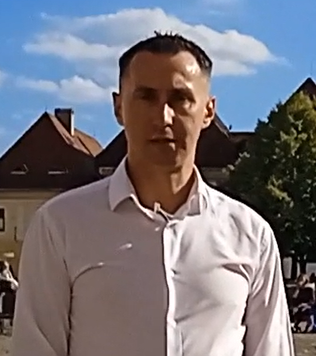
Background and Motivation
The cooperative model emerged as a natural result of two key factors: my university studies in macroeconomics and many years of observing production processes from the position of someone directly involved in value creation. This combination of theoretical understanding and hands-on experience allowed me to see how structural shortcomings of today's social and economic systems manifest across different sectors and regions around the world.
The origins of the project can be traced back to 2013, when I began writing analytical texts in search of a societal framework that would provide greater justice, stability, and efficiency. An important catalyst was a recurring personal experience—being excluded from social and workplace structures despite demonstrable results and high-quality performance. Over time, I came to understand this not as an individual or isolated situation, but as a consistent, system-driven phenomenon. This realisation became my initial motivation: to understand the mechanisms behind it and to search for solutions.
The first outcome of these efforts was a macroeconomic proposal built on two fundamental pillars, later followed by my book Kooperativizmus (2015). Although written in a more accessible, less academic style, it already contained the essential structure of the project and its logical trajectory.
In the subsequent years, the project continued to evolve naturally. I systematically studied economic literature—from left-leaning theories to liberal approaches, all the way to empirically grounded works in modern economics. This diversity of perspectives enabled me to develop a theoretical framework that transcended traditional ideological categories and moved toward an empirically supported and pragmatically formulated model.
In 2017, I completed a documentary film in which I first attempted to empirically support my concept. It introduced the macroeconomic relationship between economic democracy and productivity—a topic that only in later years began to appear in academic literature and eventually entered policy discussions within the EU and OECD. The film is no longer publicly available due to licensing and technical limitations, but it remains verifiable.
The reason I arrived at such proposals shortly after formulating the basic concept was largely pragmatic. I gradually realised that decision-making structures in today's world are often exposed to pressures and constraints that may lead to choices misaligned with measurable results or factual evidence. Their functioning is influenced by a range of systemic factors—from institutional design to social ties and group dynamics. At the micro level, these processes can be difficult to recognise and easily obscured; however, long-term comparative analyses of productivity clearly show that higher levels of economic democracy lead to greater collective output.
My own experiences across various environments therefore led me, even in the early stages, to focus on a broader macro perspective—one that later naturally aligned with the academic discourse. Important confirmation of this direction came from the work of Thomas Piketty, particularly his book Capital and Ideology (2019), which expanded global discussion on the distribution of power and its economic implications. Previous analyses tended to be microeconomic; the macro-dynamic dimension was emerging as a new and rapidly developing lens.
The combination of practical experience in value creation, macroeconomic study, and other motivational factors shaped an approach that was distinctive and ahead of its time. I gradually realised that my work was moving outside the conventional boundaries of economic thinking, something clearly visible today when looking back at what I was developing as early as 2017.
While engaging with stimulating questions and progress in economics, I increasingly experienced that many formal structures and collective environments do not always provide space for the autonomous, analytical, and non-confrontational type of work the project required. The need for intellectual independence—combined with natural changes in my private life—intensified these tensions. Initially, I perceived this mainly as a personal experience, leading me toward greater professional and personal autonomy, especially as my analytical perspective was sometimes seen as unconventional or difficult to categorise within established patterns of functioning.
As these dynamics began to affect my ability to continue developing the project, it became clear that completing the economic part required understanding and addressing the accompanying social mechanisms that influenced it. During this period, I began systematically gathering evidence of exclusionary processes. I did so across all the fields in which I worked—from services and construction, through greenkeeping and project management, to sports teams.
Despite the diversity of these contexts, the same pattern repeated itself: individuals who maintained internal autonomy, did not rely on informal power networks, and presented themselves solely through measurable performance—something essential for the project—were gradually pushed out of organisational structures regardless of the quality of their results. The fact that performance indicators were quantifiable in most of these settings allowed me to document these processes long before I understood where they would ultimately lead.
As the project developed and my professional abilities grew, I was able to improve my performance consistently across all areas, even in socially complex environments. It was a recurring pattern with similar features across different settings. Observing these dynamics with increasing distance and decreasing emotional involvement allowed me to identify their deeper, systemic causes. Over time, I began publishing short texts online—both to articulate what was happening and to offer a rational interpretation of these processes.
One of the key insights was that power structures do not form only at the level of economic and political institutions; they also arise within interpersonal relationships, group dynamics, and social identity—often through mechanisms of scapegoating. I came to understand that individuals in dominant positions often do not perceive these mechanisms, as they themselves are influenced by the same behavioural patterns that maintain group cohesion and hierarchy. Empirical results, rational arguments, or demonstrable performance often have little impact on these processes—it is systemic dynamics rather than individual intent. It was not a consequence of personal failure, but of natural group logic, the effects of which can nevertheless be substantial. Over time, I began to understand these processes more clearly and within broader systemic contexts.
Today, it is evident that these phenomena are precisely described in social-psychological literature. This also makes it clear that my initial attempts to describe these mechanisms were exploratory in nature—both in terms of methodological form and in the limited possibilities I had while maintaining the necessary degree of anonymity. Contemporary literature in this field is extensive, enabling me to significantly refine and expand my methodology.
On the economic side, I analysed the relationship between the concentration of power and productivity; on the psychological side, I examined how the same mechanisms influence motivation, creativity, and group dynamics. Across many environments, the same pattern repeatedly manifested itself, including increases in collective energy following such processes. The aim was to uncover deeper causal links between psychological patterns, power structures, and societal organisation. The underlying motivation remained the development of the economic project.
Over time, two interconnected lines emerged—economic and societal on one hand, and psychological understanding of power dynamics on the other. In the economic domain, this work resulted in the publication Odborná argumentácia kooperativizmu (2024) and a peer-reviewed academic article presenting the model's theoretical foundations. This brought the research to a level suitable for full scientific presentation.
In the psychological domain, multiple online texts were produced alongside long-term empirical observation. The repeated confirmation of identical mechanisms made possible a consistent analysis.
Across both disciplines, the same core mechanism became evident: the concentration of power and the resulting exclusion of individuals have measurable effects on performance and social stability. The project therefore opens space for a new interdisciplinary treatment of this issue. Both domains are essential—one provides motivation and structure, the other offers explanations and solutions.
The two research lines developed through the same methodological logic: long-term observation and awareness of phenomena, followed by the formulation of hypotheses and their systematic validation using existing scientific knowledge. This inductive method is standard in constructing new theoretical frameworks in the social and economic sciences. Contemporary literature in both fields confirms the accuracy of these observations and shows that the project advances beyond existing knowledge.

